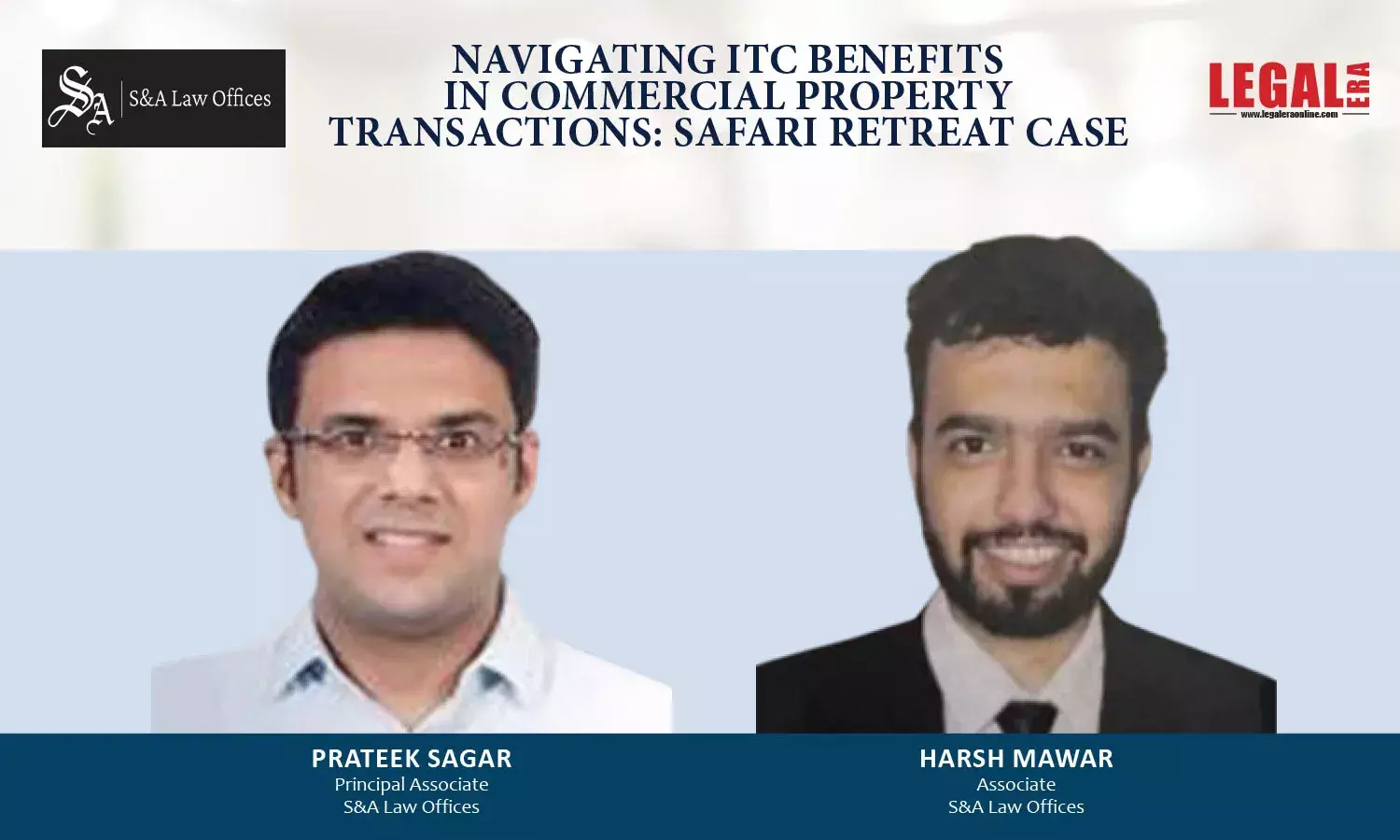Navigating ITC Benefits In Commercial Property Transactions: Safari Retreat Case

Navigating ITC Benefits In Commercial Property Transactions: Safari Retreat Case
Introduction
The interpretation of tax laws has always been a complex and evolving issue, particularly when it comes eligibility to Input Tax Credit (“ITC”) on transactions involving immovable property. Recently, Hon’ble Supreme Court (“the Supreme Court”) in its judgement in the case of Safari Retreats Private Limited vs. Chief Commissioner of CGST1 interpretated Section 17(5)(d) of the Central Goods & Service Tax Act (“the CGST Act”), which disallows ITC on goods and services used in the construction of immovable property, except for “plant or machinery”. The Petitioner, Safari Retreats Pvt. Ltd., in its petition challenged Section 17(5)(d) of the CGST Act, on the issue of eligibility of ITC on inputs used in construction of buildings meant for leasing/ renting purposes.
Bringing clarity on interpretation of tax laws
The Supreme Court in the case of Safari Retreats emphasized that tax laws must be interpreted exactly as written, without adding or subtracting anything. If the clear language of a tax law leads to contradictory results, it is up to the legislature to provide clarity on it and not the Court’s. This approach ensures that the judiciary only interprets the law and does not change it, maintaining the separation of powers between the judiciary and the legislature. It is to be noted that when tax laws can be interpreted in more than one way, the interpretation that benefits the taxpayer should be chosen. This means that if a tax law is unclear, the Supreme Court will usually side with the taxpayer rather than the tax authorities. This approach helps protect individuals and businesses from unfair or unexpected tax claims, providing them with more certainty and less fear of unexpected liabilities.

The Supreme Court stressed that tax laws should be interpreted strictly based on their clear wording, without adding any assumptions or implied meanings. This ensures that taxpayers are only responsible for what is explicitly stated in the law, protecting them from unfair penalties and vague requirements. The Supreme Court recognized that sometimes a strict interpretation of tax laws might lead to unfair results that the lawmakers didn’t intend. In such cases, the Supreme Court can adjust the interpretation to avoid these unintended consequences.
Summary of the Supreme Court’s observations on ITC and Section 17(5) of the CGST Act
The judgement has a significant implication for the interpretation and application of ITC provisions under the GST regime in commercial property transactions. This case primarily examined the constitutional validity of Section 17(5) (c) and (d) of the CGST Act and interpreted the meaning of term “plant and machinery”. Key discussions in the judgements are summarized as under:
Key issues addressed by the Supreme Court
1. Constitutional Validity of Clauses (c) and (d) of Section 17(5)
The Supreme Court began by upholding the constitutional validity of clauses (c) and (d) of Section 17(5) of the CGST Act. The Supreme Court highlighted that ITC is a statutory right granted by law, rather than an inherent entitlement and the legislature created exceptions, especially in the complex realm of tax law. The Supreme Court concluded that the provisions of Section 17(5) of the CGST Act are neither arbitrary nor discriminatory which are in adherence to the principle of reasonable classification under Article 14 of the Constitution of India.
2. Interpretation of “and” vs “or”
A pivotal point of discussion in the judgement is interpretation of term “plant and machinery” as is used in Section 17(5) of the CGST Act and Explanation thereto. The Supreme Court noted that while the term “plant and machinery” is used multiple times and explained further in Explanation to Section 17(5) whereas, the term “plant or machinery” is used only once in clause (d) of Section 17(5) of the CGST Act.
The Supreme Court observed that use of the term “plant or machinery” instead of “plant and machinery” signifies the legislative intent to deliberately exclude the term “plant or machinery” from the definition provided in the Explanation to Section 17(5) of the CGST Act.
3. Whether Building is a “Plant”
The Supreme Court held that the functionality test is to be applied to determine whether a building can be considered a “Plant” and observed that a building designed and constructed to meet specific technical requirements essential for the operations of the business, qualifies as a plant. Thus, the term “Plant” defined in Explanation to Section 17(5) of the CGST Act which excludes land and buildings cannot be given a restricted meaning and hence the functionality test gains relevance for determination of availing ITC of goods and services procured in construction of a building.
Implications of the Judgment
The Supreme Court's verdict has far-reaching consequences as to how businesses should approach ITC claims in the different sectors, some of which are discussed below:
1. Availability of ITC on Works Contract Services - The judgment confirms that ITC claims for works contract services used in the construction of immovable property intended for leasing or renting purposes are barred under Section 17(5)(c) of the CGST Act. This limitation means that companies cannot claim ITC on these services, which are integral to construction services.
2. Commercial Properties - For properties such as shopping malls, commercial complexes, and residential units, assessee must demonstrate that the constructed property satisfies the functionality test to avail ITC on goods and services used in construction of the said property. This requirement offers a potential pathway for businesses to claim credit, provided they can substantiate their claims.
3. Warehouses and Co-working Spaces - Similar principles of functionality test on case to case basis apply to warehouses and co-working spaces. Companies looking to avail ITC should maintain documents to substantiate their claims.
4. Hotels and Cinema Theatres - Notably, the Supreme Court explicitly excluded hotels and cinema theatres from being classified as “Plant”. This decision limits the potential for these industries to claim the ITC benefit under the current interpretation, emphasizing the need for further judicial clarifications.
5. Factory Buildings - Although the Supreme Court did not provide a definitive ruling on factory buildings, it indicated that the functionality test will also apply to factory buildings. This determination will require businesses to analyze whether their factory buildings meet specific technical requirements essential for business operations to qualify for ITC.
Conclusion
The Supreme Court's verdict in Safari Retreats provides clarity regarding the interpretation of relevant tax laws. However, the decision creates ambiguity whether an assessee is eligible to claim ITC on building or not and leaves it open to determination based on the facts of the case.
Practical implementation of the Supreme Court’s judgement in considering “building” as “plant” will still pose a challenge and GST authorities will continue to dispute the ITC availed in respect of buildings by way of issuing notices. In the past as well, while interpreting the decision of the Supreme Court in the case2 of the Northern Operating Systems (“the NOS judgement”) and CBIC instruction3 issued in furtherance to the NOS judgement, the GST authorities had been instructed not to mechanically issue demand notices by extending the NOS judgement to each case without ascertaining their facts. However, show cause notices were still issued rampantly by the GST authorities. Therefore, alleging and confirming tax demands without ascertainment of facts defeats the entire purpose of the Supreme Court’s judgement.
It is important to note that while the limitation period for availing ITC of past period under Section 16(4) of the CGST Act may pose challenges, the judgement provides grounds for assessee to argue against such limitations during re-availment. Additionally, since works contract services remain excluded from the scope of this judgment, businesses should contemplate restructuring their agreements to optimize future ITC claims. Overall, this decision is a significant development in tax law interpretation, promoting a more equitable treatment of assessee’s rights and offering a roadmap for navigating ITC claims in commercial property transactions.
Disclaimer: This article was first published in the S&A Law Offices - 'Indian Legal Impetus' newsletter in October 2024.
2. CC, CE & ST Vs. M/s Northern Operating Systems Pvt Ltd [2022 (61) GSTL 129 (SC)]
3. Instruction No. 05/2023-GST dated December 13, 2023

